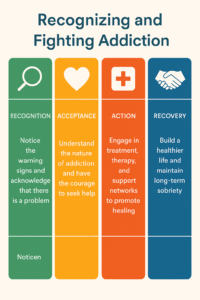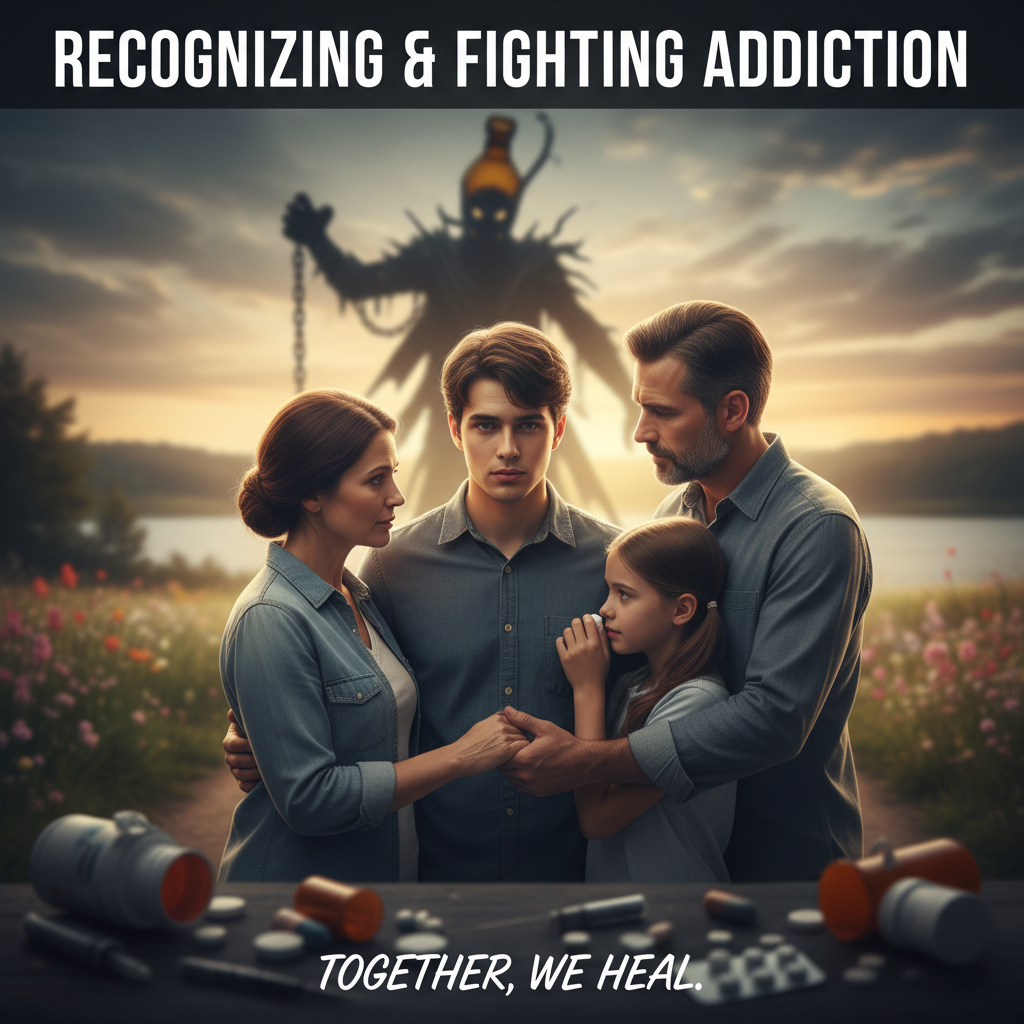If you or someone close to you is struggling with addiction, the idea of breaking free can feel tough and out of reach. Figuring out what addiction actually looks like and learning how to fight back is a process that takes absolute honesty, patience, and helpful tools. I’ve been there myself, so I know how confusing the ride can initially feel. Here, I’m sharing what I’ve learned about spotting the early signs, making sense of what’s happening, and taking practical steps to overcome addiction for good.
Understanding Addiction: What It Really Means
Addiction isn’t just about using a substance too much or having a habit you can’t shake. It’s a health condition that changes your brain chemistry and affects your behavior, thoughts, and relationships. Many people imagine addiction as only involving drugs or alcohol, but it can include gambling, internet use, shopping, food, or even exercise. Knowing what addiction is—and what it isn’t—makes it much easier to see your own situation clearly and seek the right help when you need it.
Over time, addiction has switched from being labeled a personal weakness to a recognized medical condition. Research from sources like the National Institute on Drug Abuse shows that addiction is a chronic brain disorder, not just a lack of willpower. That knowledge can take a lot of shame and self-blame for getting help. Understanding that addiction grows fast among all kinds of people, regardless of background, is the first important step to getting the proper support.
How to Spot the Signs of Addiction
Recognizing addiction early is super important because the sooner you spot it, the easier it can be to turn things around. I’ve seen that most people, myself included, don’t always realize they’re dealing with addiction until things are really out of control. Here are the main signs I see most often:
- Loss of Control: Trying to cut down or stop, but not being able to, no matter how hard you try.
- Neglecting Responsibilities: Work, school, relationships, or hobbies start to slip because the behavior or substance is taking over your time and energy.
- Withdrawal: When you try to stop, you feel anxious, depressed, restless, or physically sick.
- Increased Tolerance: Needing more substance or behavior to feel normal.
- Secrecy and Denial: Hiding your use, lying about it, or getting defensive when someone else brings it up.
- Continued Use Despite Harm: Even though it’s causing problems in your life, you keep returning to it.
Not everyone spots every sign, but two or three of these are worth taking seriously. Talking to a health professional or someone you trust can help you figure out if what you’re experiencing could be addiction.
First Steps to Breaking Free from Addiction
Taking that first step feels scary, but it’s doable with the right approach and support. Here’s what helped me and lots of others I know:
- Admit There’s a Problem: This isn’t about beating yourself up. Instead, it means being honest. Writing down what’s happening can help.
- Reach Out for Help: Talk to a trusted friend or family member. Connecting with someone breaks the isolation and makes the problem feel lighter.
- Learn About Your Triggers: Notice when you feel like using or engaging in your addictive behavior. Are you bored, stressed, or sad?
- Pick One Small Goal: Instead of quitting everything overnight, try cutting back gradually or avoiding certain situations.
- Look for Support Groups: Groups like Alcoholics Anonymous, SMART Recovery, or counseling sessions can be helpful even if you first listen.
These steps can move you from feeling stuck to actively problem-solving. Every bit counts, and small wins stack up surprisingly fast. You don’t have to solve everything simultaneously—progress is the smallest positive step.
Common Roadblocks and How to Deal with Them
No recovery adventure is ever totally smooth. I’ve hit my share of bumps and hear the same stories from others progressing. Here’s how to tackle the most common hurdles people run into:
- Fear of Withdrawal: The symptoms can be uncomfortable, but usually don’t last forever. If you’re dealing with heavy alcohol, benzodiazepine, or opioid use, make sure to seek medical supervision. Drinking lots of water, getting rest, and talking to a doctor can help.
- Cravings: Urges come and go. Simple things like walking, calling a friend, or distracting yourself with a hobby can help lower cravings long enough for them to pass.
- Slipping Up: Relapse is standard and not a reason to give up. Think of it as feedback; examine what triggered it and what you can do differently next time.
- Lack of Support: Some people around you might not get it. Online forums and local recovery groups can fill that gap and offer community when needed.
- Stigma: There’s still a lot of misunderstanding about addiction, but remembering that it’s a medical condition (not a moral failing) can help you stay motivated and focused.
Dealing With Withdrawal
Withdrawal symptoms can make quitting feel impossible, but they’re temporary. Most substances only last a week or two. If you’re going through a particularly rough withdrawal or using things that might be dangerous to quit suddenly, like alcohol or benzos, work with a doctor or check into a detox facility. Some medications can reduce cravings and make the process smoother. Treating your body kindly—getting good sleep, staying hydrated, and eating nutritious food—will help speed recovery. Even mild exercise, like stretching or a short walk, relieves stress and supports your healing.
Cravings and Triggers
Cravings often sneak up when you’re bored, stressed, or in a familiar environment linked to your addiction. Try switching up your environment, chewing gum, or texting a friend when the urge hits. Some helpful apps like Quit That! or I Am Sober offer motivation and healthy distraction tactics. Journaling your cravings and noting what makes them appear can help you avoid those situations next time, or at least be extra prepared.
Building Your Recovery Toolkit: Strategies That Work
I’ve found that lasting recovery comes from having a toolbox of coping strategies, not just relying on willpower. Mix in some of these tools to see what sticks for you:
- Behavior Replacement: Find another activity (even if it feels forced initially), such as exercise, painting, or just stepping outside. It’s amazing how effective a ten-minute walk can be.
- Journaling: Writing down your thoughts helps make triggers and patterns disappear.
- Accountability Buddy: Find someone who understands your situation and check in regularly.
- Mindfulness: Apps like Headspace or Calm walk you through simple meditation and breathing exercises, which are helpful when you feel overwhelmed.
- Professional Counseling: If you feel stuck, therapists who have a background in addiction recovery can provide new strategies and lasting support tailored to you.
Mixing and matching these strategies helps create a solid safety net for rough days and setbacks. Routines and new hobbies serve as a replacement for old behaviors, and can be genuinely fun, which is something people struggling with addiction sometimes forget is even possible.
Why Social Support Makes a Difference
Adding friends, family, or peers in recovery to your adventure is one of the best ways to boost your chances. Trusted people give encouragement, share new perspectives, and help you stay on track when your own motivation dips. Recovery communities, whether in person or online, offer judgment-free space to talk about what you’re facing, which helps reduce stress and loneliness.
- Peer Groups: Local support meetings, SMART Recovery, or online forums like Reddit’s r/Stop Drinking provide helpful community guidance and shared stories.
- Mentors and Sponsors: Connecting with someone who’s walked this path before can provide a steady hand, especially when things get tough.
- Trusted Family or Friends: Even one understanding friend can pump up your resilience through recovery.
Don’t be afraid to ask for help or to accept encouragement. It can be tough at first, but social support can really improve your recovery chances in the long run.
FAQs: Your Addiction Recovery Questions Answered
If you’re starting—or calmly thinking about whether addiction really fits your situation—these questions usually come up:
Question: Can addiction really happen to anyone?
Answer: Yes. Genetics, environment, trauma, and mental health all play a role. It’s not a character flaw and can affect anyone, regardless of background.
Question: Is it possible to overcome addiction without rehab?
Answer: Yes. While some people need inpatient rehab for severe addictions, lots of people recover using outpatient services, online support groups, or personal strategies. The best approach depends on your situation; there’s no correct answer.
Question: What should I do if someone I love is struggling with addiction?
Answer: Start with listening and offering support without judging. Sharing your concern, providing information, and encouraging professional help can do a lot. Remember to set healthy boundaries and take care of yourself, too.
Question: Are relapses a sign of failure?
Answer: No. Relapses are common, so the current approach might need some tweaking. Each setback can be a lesson in what works and what doesn’t—think of it as a chance to adjust, not give up.
Creating a Personalized Recovery Plan
Every person’s recovery adventure looks a little different. It’s helpful to experiment with various strategies and stay honest about what’s working and what isn’t. Please write down your reasons for quitting and set small, weekly goals, such as reaching out to a recovery friend or making it through a weekend sober. Having an emergency plan for hard days and regularly checking in with a counselor or recovery buddy helps you stay focused.
Recovery is not about perfection or finding a magic fix. Every step forward, even the smallest, deserves a celebration. If you’re dealing with addiction right now, remember that you’re not alone. With steady changes, support your trust, and honest check-ins, you can start fresh and break free for good.
Video: What Most People Miss About Addiction!

